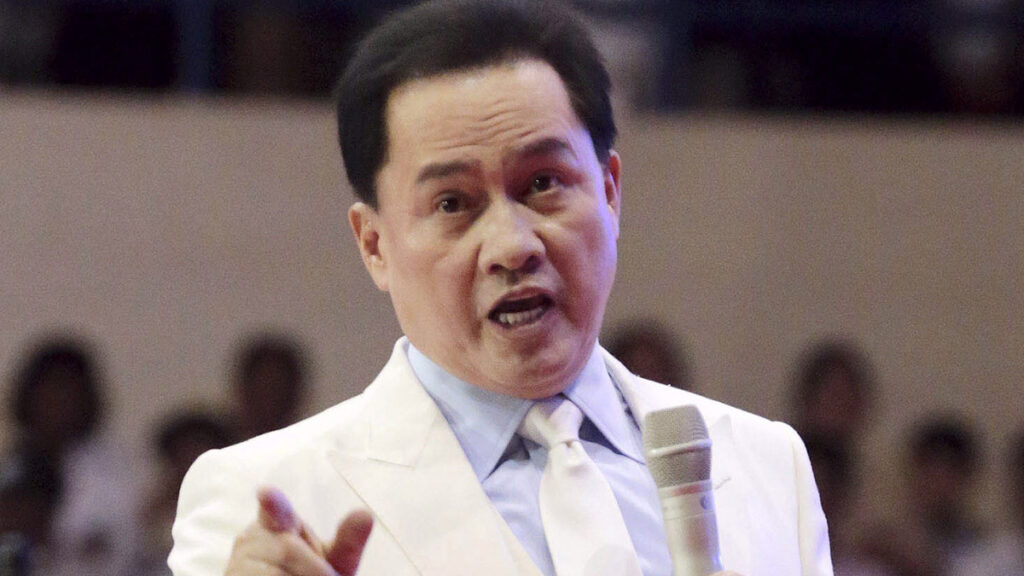

Fugitive televangelist Apollo Quiboloy. —Inquirer file picture
DAVAO CITY, Philippines — The seek for the Kingdom of Jesus Christ (KJC) fugitive chief, Apollo Quiboloy, has entered its fifth day, and the Philippine Nationwide Police is sending extra personnel for deployment at varied factors of the KJC compound.
Brigadier Normal Roderick Augusta Alba, regional command director for police group relations, mentioned that the extra forces began arriving in batches on Tuesday evening and got here from different components of Mindanao.
The Military would additionally contribute troopers—as much as 4 firms—to accentuate the operation launched on Aug. 24 to serve arrest warrants on Quiboloy and his 4 coaccused in reference to their youngster abuse and human trafficking instances, mentioned Lieutenant Normal Rex Bergante, commander of the Japanese Mindanao Command of the Armed Forces of the Philippines.
READ MORE:
Court docket: TPO doesn’t nullify PNP’s serving of arrest warrant vs Quiboloy
Police investigating the id of people in Moalboal intercourse video
Quiboloy turf combed by 2,000 cops, no letup, vows police chief
The reinforcements got here as police groups stepped up the search in areas of the KJC compound the place the rich and politically influential pastor is believed to be hiding.
“We’re nonetheless searching for him [but] we at the moment are making centered searches,” Brig. Gen. Nicolas Torre III, the Davao regional police chief, informed reporters on Wednesday. “We won’t do that except we’re very satisfied that he’s there.”
Torre mentioned they had been now searching for entry factors to “bunkers’’ within the compound, which they intend to entry in a “non-invasive” method in order that “nothing might be destroyed.”
No repeat of protest
At this level within the operation, he mentioned, the police are additionally ensuring that KJC members and their sympathizers won’t be able to mount one other mass motion that may disrupt the search or trigger a disturbance in the local people, like what occurred on Sunday evening after they occupied a stretch of the Carlos P. Garcia Freeway.
The commander vowed to respect the non permanent safety order (TPO) sought by the KJC and later granted by Regional Trial Department 15 Choose Mario Duaves, however belied claims that the raiders had been proscribing the actions of the sect members.
“In the event that they had been being restricted [from] going out of the KJC (compound), how had been they capable of transfer two firetrucks and two large cranes?” Torre requested, referring to the automobiles the protesters used as barricades on Sunday. The blockade was arrange on the street resulting in the compound and likewise blocked an exit route from Davao Worldwide Airport.
“They had been those placing up restrictions (for the search groups),” Torre burdened. “You need to by no means intervene within the service of a warrant.”
TPO clarified
Journalists allowed entry into the KJC compound on Wednesday discovered lots of of cops resting underneath the bushes and on the garden.
A police official—one who had seen motion in main operations in Mindanao just like the 2013 Zamboanga siege, the 2015 Mamasapano assault in opposition to the terrorist Marwan, and the 2017 Marawi Metropolis siege—mentioned that they had not been capable of take a shower since being deployed right here.
In the meantime, talking to reporters, KJC resident minister Carlo Catiil mentioned the group’s authorized victory in securing a TPO proved short-lived as a result of Torre didn’t withdraw his forces and as an alternative “continued their seek for (sounds of a) heartbeat,” alluding to the raiders’ use of high-tech gear.
“He appeared to have a distinct considering (from ours) relating to the TPO,” Catiil mentioned.
However Choose Duaves on Wednesday issued a supplemental order clarifying that the TPO “didn’t cancel or nullify the processes associated to warrants of arrest.”
Learn Subsequent
Disclaimer: The feedback uploaded on this website don’t essentially characterize or replicate the views of administration and proprietor of Cebudailynews. We reserve the proper to exclude feedback that we deem to be inconsistent with our editorial requirements.

